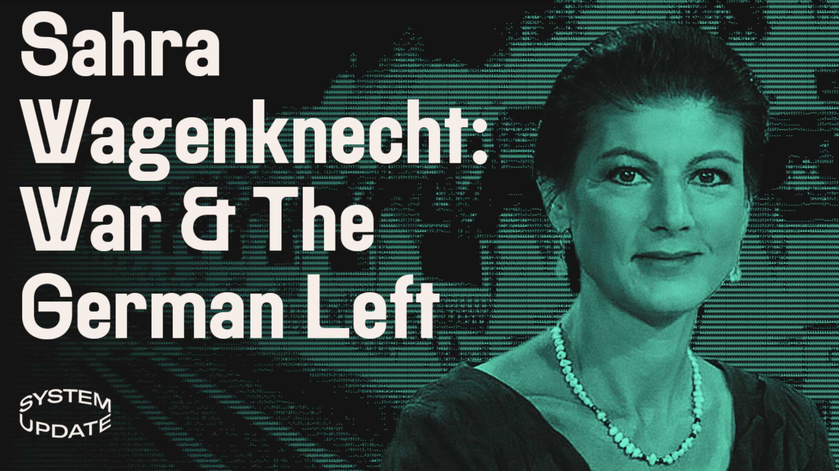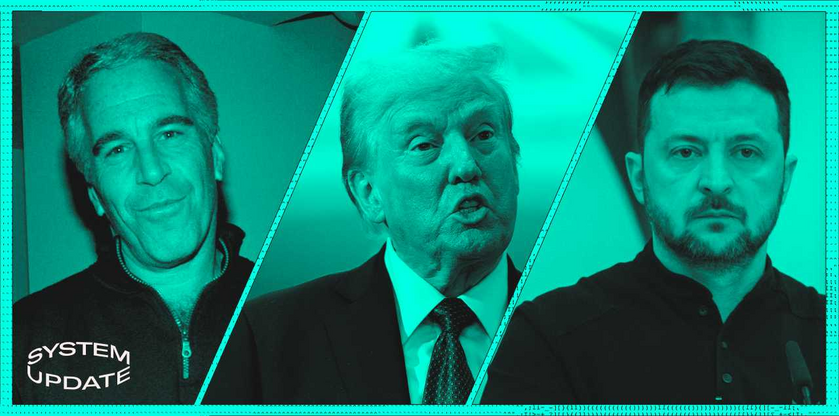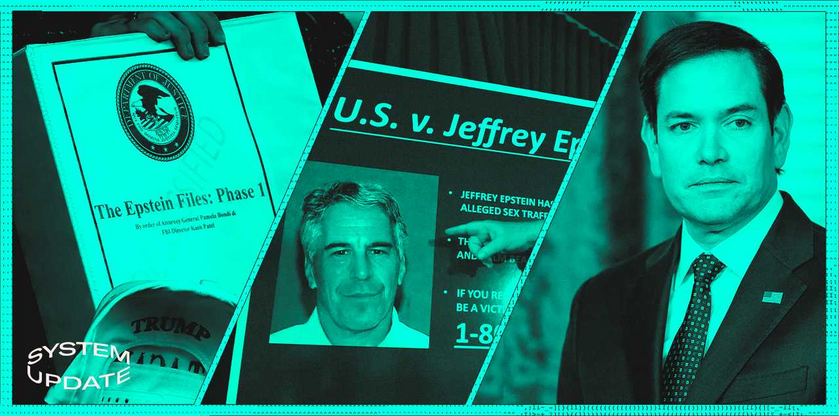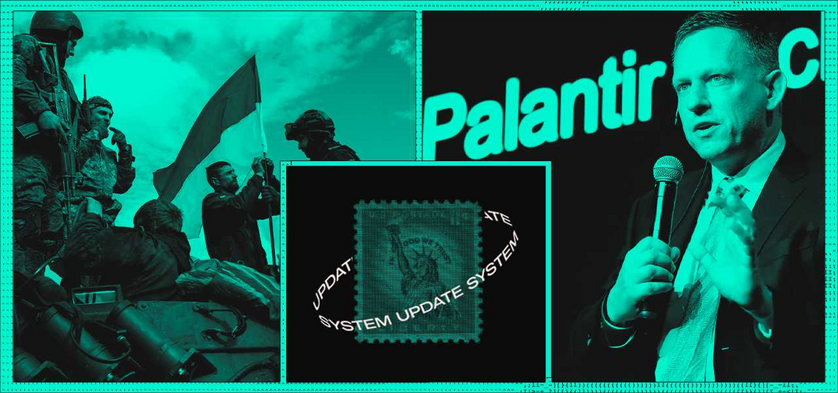Good evening. It's Monday, January 30th. Welcome to a new episode of System Update, our new live nightly show that airs every Monday through Friday, at 7:00 pm, exclusively here on Rumble, the free speech alternative to YouTube.
Tonight, I'm very excited to share with you one of the most interesting and enlightening interviews I've ever conducted with a political leader over my almost-twenty years as a journalist. It's with one of the three or four most influential and famous politicians in Germany, Sahra Wagenknecht. Germany – given its economic power and geographic position in Europe – is always an important country, but particularly so now given the increasing role it is playing in the NATO proxy war against Russia in Ukraine.
One could reasonably argue that the 20th Century was dominated by two different relationships – the United States and Soviet Union, which drove the Cold War, and Germany's relationship with Russia, which were key factors in both world wars and then the shape of European politicians after the fall of the Berlin Wall. Whenever Germany and Russia began to escalate their hostilities with one another, very bad things typically happen for the world. Given that this is now happening, paying attention to the internal dynamics in Germany is highly recommended.
But Wagenknecht has become such a fascinating figure for reasons that extend far beyond Germany. Her trajectory represents, and is being driven by, political dynamics that are highly visible in most Western democracies – most definitely including the U.S.
She has always been a woman of the left. As the Guardian explained in a profile from December, 2022:
She has been compared to iconic political figureheads such as Frida Kahlo and Rosa Luxemburg, as much for her strident leftwing views as for her striking looks.
Sahra Wagen-knecht is a household name in Germany and the best-known figure on the far left. The most prominent and outspoken member of the 15-year-old Die Linke party, she has been rattling the Berlin political scene for years with her vague pronouncements that she is planning to form her own breakaway bloc.
Approval ratings are on her side, as are the up to 2 million viewers known to tune in to her regular YouTube broadcasts.
But the real purpose of the Guardian article was to examine what it says – quite validly – is her growing popularity among what liberal outlets call the German far right, meaning the anti-establishment, populist right. As the Guardian explained:
“But now the woman revered as something of a heroine of the German left by some is receiving overtures from the far-right Alternative für Deutchland, with party influencers urging her to effectively join forces with them.
She recently appeared on the front page of the monthly magazine Compact, a self-declared mouthpiece of the AfD. In its latest issue her upturned face appears next to the cover line: “The best chancellor – a candidate for the left and the right.”..
Political insiders believe Wagenknecht is biding her time and waiting for the right moment to leave. She has said: “I am still a member of the party, but I see the need for a credible party that stands for peace and social justice.
Polls show her chances of succeeding as head of a new party to be good. In research by pollster Insa, 10% of voters signalled they would be “very certain” to vote for her. In a survey for Der Spiegel magazine carried out by Civey, 30% said they could imagine supporting her. In eastern Germany her approval rating is even higher, with 49% saying they would consider voting for her.
Among AfD voters the interest was a staggering 68%, a percentage point above the proportion of Die Linke supporters who would back her. Among conservative voters of the Christian Democratic Union/Christian Social Union alliance, a quarter said she was an option for them. The lowest support of 7% was among Green voters. Wagenknecht recently called the party “the most dangerous in the Bundestag” over its environmental reforms.”
The reasons she has gained popularity among voters who have traditionally voted for right-wing parties – and the reasons she has become an increasingly polarizing figure among the German right – should be familiar to anyone paying attention to the shifting dynamics of the politics of any Western democracy.
She has become the country's most vocal opponent of increased German escalation in the war in Ukraine, and has even questioned the ongoing value of German membership in NATO. Like Britain's Jeremy Corbyn and many populist right-wing leaders, she was an outspoken opponent of COVID vaccine mandates and many of the more repressive lockdown measures. She aggressively argues against mass immigration into Germany on the age-old left-wing ground – recently abandoned at the altar of identity politics – that immigration harms ordinary Germans and the working class by driving down wages and benefiting only international neoliberal capital (while she is born in Germany, her parents are of Iranian descent, but - needless to say - that doesn't stop white German leftists from accusing her of racism for her anti-immigration views).
And she is scathingly critical of how the left has increasingly become a faction dominated by highly-educated, wealthy cosmopolitan elites as a result of social justice causes - such as Gender Ideology - that alienates the core values of many ordinary Germans, for whom - she believes - leftist elites harbor barely disguised contempt.
In this interview, we discuss her political trajectory; her views on all of those issues; we delve deeply into her views on the war in Ukraine generally and the relationship of Germany to both Russia and France; her views on why the left is increasingly losing touch with the working classes of the West; whether she seeks or wants a coalition with parts of the populist German right; and her vision for how to improve our politics and democracies in general.
Whatever else one may think of her, Wagenknecht is a deeply original and informed thinker. She clearly has no fear of alienating allies and forging her own path. And I found the entire discussion very refreshing in terms of her candor and the clarity of her thought, and am confident you'll find it as illuminating as I did.
GG: So, first of all, thank you so much for taking the time to talk to us. We have, I think, a lot of interesting topics to cover. Germany is very much in the news throughout the West. And, before we get to that, I just want to begin with a question about you, because your politics from the very beginning has been defined by an association with left-wing politics, at times even communist or socialist politics. Can you talk a little bit about the trajectory of your ideology and how you consider your politics best described today?
SW: I got into politics relatively early. It was in the nineties. I did political work on a voluntary basis and got involved with the left. That was after Germany's reunification, and unemployment was huge in the East. That's how I started my political career. Then the Left Party was founded in Germany, and I started working full time for them. I got elected to the European Parliament for five years in 2004. After that, from 2009 on, I've been in the Bundestag and was also the parliamentary group leader of the Left. The Left Party has had a history of ups and downs. It once had around 12 percent of the votes, but has lost a lot of trust among people in recent years. I'm still a member of parliament, and I'm now involved in issues such as war and peace.
I am against this sort of insane drunkenness about war that all the other parties celebrate. Arms deliveries, tank deliveries; it's critical that more resistance emerges; that's a very important issue for me. And then there are the social and economic issues in Germany. The economic sanctions [against Russia] in particular are hurting the economy and people in Germany; everything has become much more expensive. These are the issues that are currently moving a lot of people here.
GG: So for as long as I can remember left-wing politics in the U.S., and in Europe, and in Germany was always against war and now some of the leading voices in your country and in the United States in favor of more involvement in the war in Ukraine are coming from the left. I’m wondering, do you see yourself as being ideologically consistent over the years, still a member of the left? Or do you think that people who identify on the left have themselves changed their ideological outlook?
SW: A quite radical change has taken place. In Germany, the Green Party was founded in the 1980s with deep roots in the peace movement; they were pacifists. The Greens were always against arms, against war, and against military missions. But that has changed in recent years. The Greens were in a coalition with Chancellor Gerhard Schröder when the war in Yugoslavia started and Belgrade was bombed. The Greens supported that.
It was a bit more complicated during the Iraq War, in which Germany did not participate, but that was rather an achievement of the Social Democrats. The Greens would probably have gone along with the war. In recent years, the Greens have become more and more aggressive. Today, they are the worst war party we have in Germany. Mrs. Baerbock [the Foreign Minister] has just said publicly that we are at war with Russia, which fortunately does not correspond with reality. We are not officially at war; NATO still holds the position that we supply weapons but are not a war party. Otherwise, the war in Europe could escalate to such an extent that the survival of the continent would be in danger.
You can see how completely self-delusional and insane this policy is, as well as how oblivious it is to history. I think this is an important aspect: Tanks are now rolling into Ukraine to shoot at Russian soldiers. It will undoubtedly reawaken deep traumas in Russia. Nazi Germany's war of extermination against Russia happened 80 years ago, but it has not been forgotten. German tanks against the Russians mean more or less the same as if we were to deliver tanks to fight against the Israelis. This policy is completely self-delusional.
Our policy is only following the United States. The United States is the only one that benefits from this war. Their arms industry benefits, their gas industry benefits, and their energy companies benefit because they can finally sell their fracking gas to Europe. And they will benefit from new investments. The U.S. is suddenly much cheaper and better than Europe because energy prices are very high here. The U.S. also benefits geostrategically. NATO is making a huge comeback. NATO was declared "brain-dead" by French President Macron just a few years ago, but now no one is questioning NATO anymore. That also means that no one is questioning the leadership of the United States. NATO is the primary tool of US dominance, and German politics fully supports it; in particular, a large part of the left, particularly the Greens, supports this position to an extreme.
















